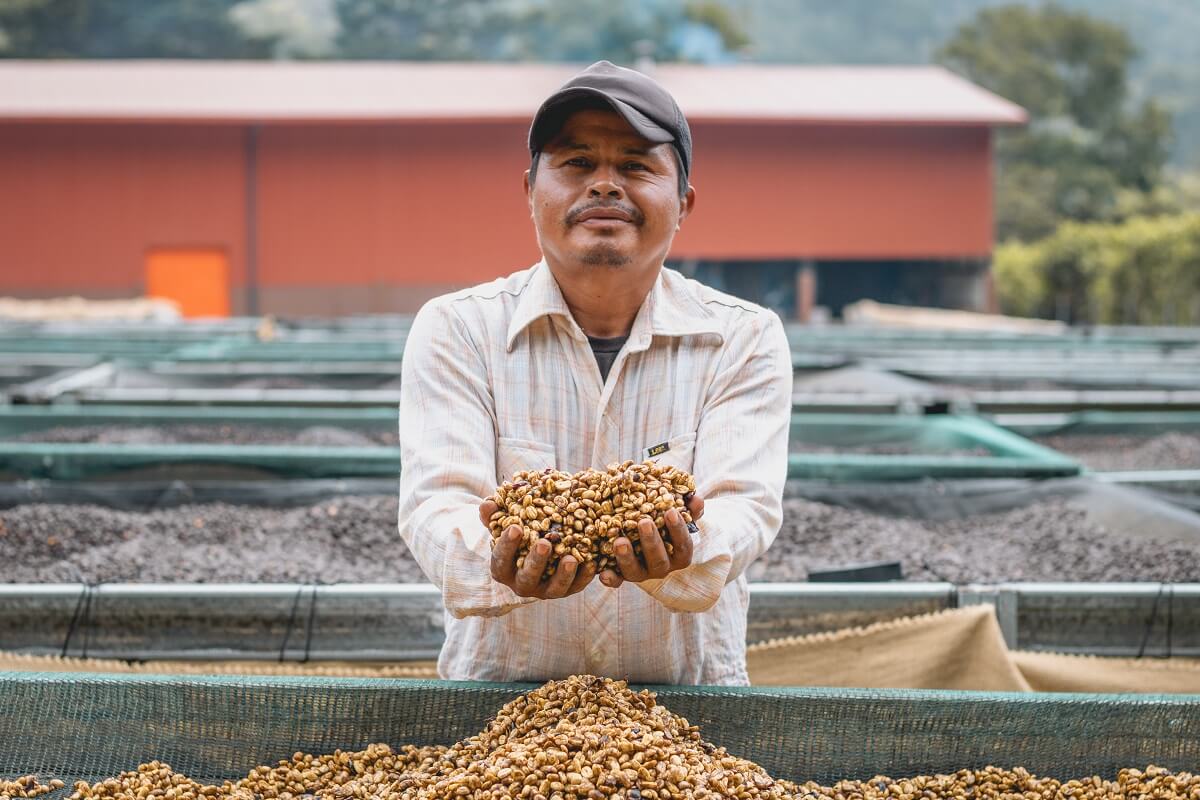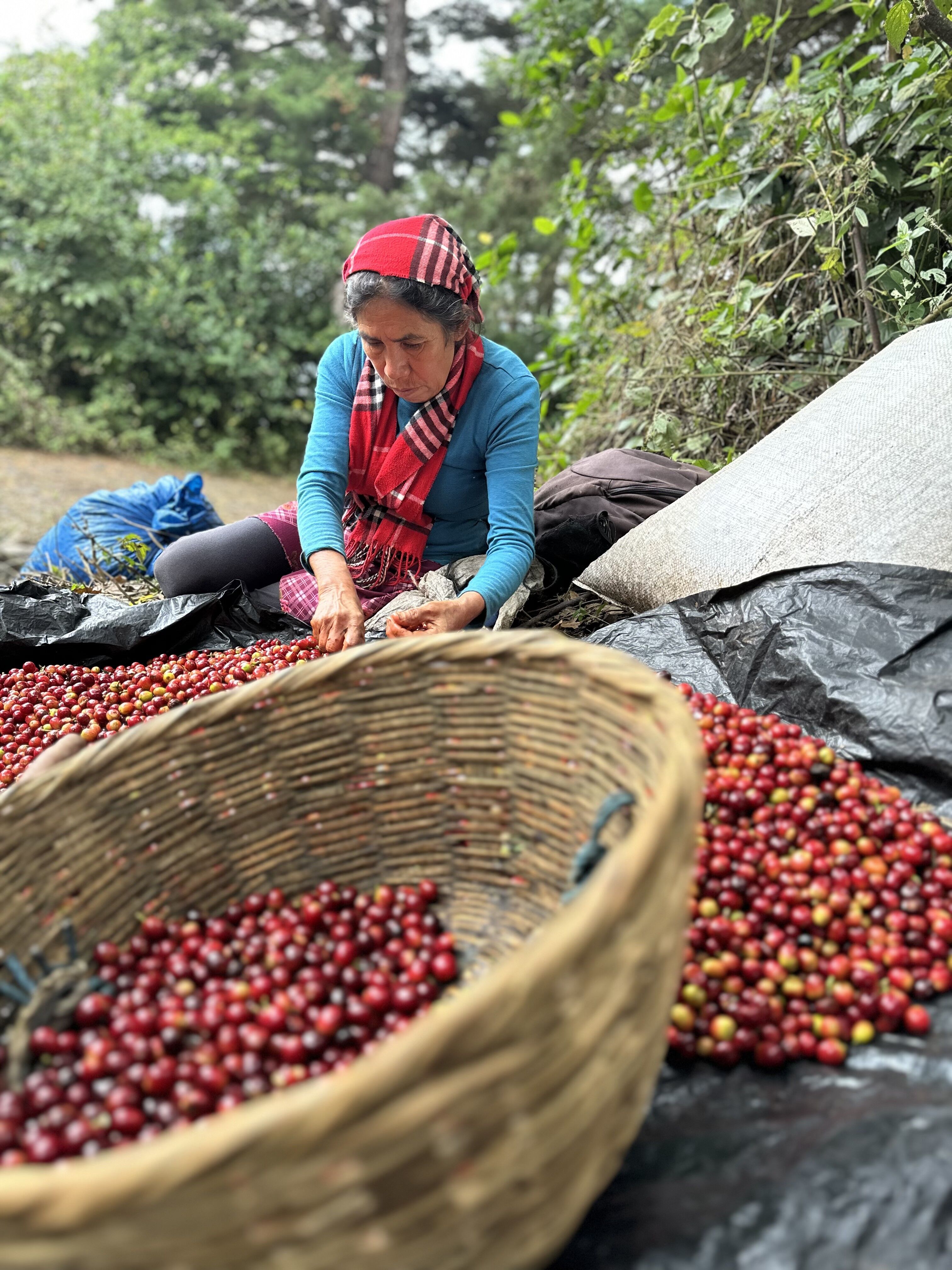Firstable, selective harvesting is done on the farm to achieve the appropriate level of ripeness and achieve good fermentation. After manual selection, we take our coffee to the wet mill, where we classify or separate it by density. After we obtain the ideal beans for our process, the cherries are placed in fermentation tanks, water is added, and they are left to ferment for 40–50 hours, depending on how long it takes to reach the desired pH. Once fermentation is complete, we remove the coffee from the fermentation tanks, carry out our pulping process, and, once again, the freshly pulped coffee is returned to the fermentation tanks and left to ferment for 48–60 hours, until it reaches the required pH. Finally, the coffee is transferred to patios for two to four days to be pre-dried. It is then harvested and placed on raised beds to finish drying.
Los Naranjos
El Salvador - Sonsonate - Naranjos - Pacamara - Natural Anaerobic
Pick your crop :
Aromatic notes:
Spot price
€/kg
How is this coffee processed?
Apaneca is a municipality located in the department of Ahuachapán, El Salvador, and is widely recognized for its mountainous surroundings, temperate climate, and importance within the Ruta de las Flores (Flower Route). Agriculture is the economic pillar of Apaneca, with coffee farming being the most prominent activity.
Coffee growing is a deeply rooted tradition in Apaneca, passed down from generation to generation, and constitutes an essential part of the municipality's cultural identity. Coffee generates direct and indirect employment for a large part of the population, especially during the harvest season (cutting) between November and March and contributes to the development of small businesses (cafés, cooperatives, craft sales), which diversifies the economy.
Los Naranjos Café was founded in 2015 and, initially all of its production was outsourced until Los Naranjos coffee mill was built in 2019. Since then, the company has been responsible for carrying out the entire process, from harvesting, processing, and finally exporting.
Los Angeles farm is located a few minutes from the town of Apaneca. It has a loam soil, its land is totally flat, so it lacks the possibility of erosion or another type of related loss; In addition, it has a large content of organic matter with a large amount of shade and ideal microclimates for the Pacamara coffee tree.
This farm is composed just by Pacamara 100%.
This farm is herbicides – free. Pure REGENERATIVE AGRICULTURE.
Marketing tools & Certifications
POS displays, postcards, QR codes for packaging, ...
- El Salvador
Origin
Region
Sonsonate - Los Naranjos
Producer
Species
Arabica Variety
Pacamara
Process
Natural Anaerobic
Drying
25 days drying beds
Packaging
35kg - Jute bags
Altitude
1350 Harvest period
December - March Type of harvest
Manual
The region Sonsonate
Since the introduction of its first seedlings in the 1740s, Arabica coffee cultivation initially reached Ahuachapán, Santa Ana, and Sonsonate, encouraged by agrarian colonialism, which, between 1870 and 1930, promoted the expulsion of communal lands in favor of a landed elite, the so-called 14 families, consolidating itself as the country's economic foundation. In Sonsonate, especially in municipalities such as Juayúa, Izalco, Salcoatitán, and Nahuizalco, coffee became the local economic backbone, generating employment and increased population on coffee farms and in processing plants.
In terms of production, Sonsonate has been part of the country's so-called western coffee mountain range, providing high-quality coffee, especially shade-grown varieties like Bourbon and Pacas. Despite this, recent decades have been marked by a severe crisis: diseases like coffee rust, climate change, low profitability, and the abandonment of farms have significantly reduced production and employment in the area.
From an environmental perspective, the shade – grown coffee plantations that predominate in Sonsonate function as forests, capturing carbon, regulating watersheds, and preserving biodiversity. Nearly 95% of the crops are shaded and provide approximately 7.8% of the national vegetation cover.
Today, coffee farms not only generate income and temporary and permanent employment for thousands of families in the region, but they also define the economic mobilization and organization of many rural communities.
Meet Los Naranjos
Analyzed to the nearest gram
Find detailed physical and sensory analyzes of your coffee in the quality sheet with:
- Density
- The humidity level
- Water activity
- Colorimetry
- The sieve
- The nature of the defects
- The score and its details
- The aromatic profile (downloadable)
Coffees of Los Naranjos

How is this coffee processed?

How is this coffee processed?
Equipments selection
Unit price
€ ex.tax/U
From xx products
€ ex.tax/U
Unit price
€ ex.tax/U
From xx products
€ ex.tax/U
Unit price
€ ex.tax/U
From xx products
€ ex.tax/U
Unit price
€ ex.tax/U
From xx products
€ ex.tax/U
Unit price
€ ex.tax/U
From xx products
€ ex.tax/U
Unit price
€ ex.tax/U
From xx products
€ ex.tax/U
Unit price
€ ex.tax/U
From xx products
€ ex.tax/U
